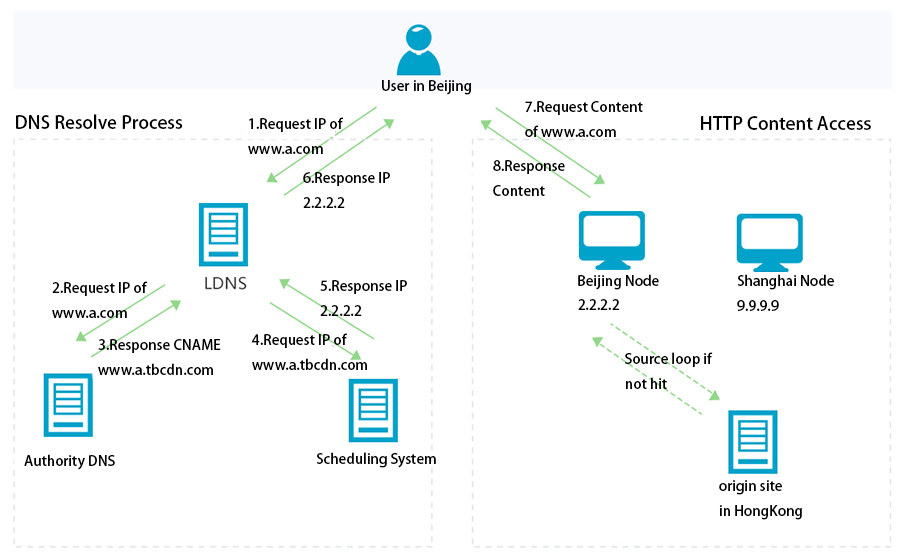Alibaba Cloud Content Delivery Network (CDN) is a distributed network built over the transport network that consists of edge nodes deployed in different regions across the world. Alibaba Cloud CDN caches static and dynamic resources from origin servers to the edge nodes and allows users to retrieve desired content from the edge nodes. Alibaba Cloud CDN reduces workloads on origin servers to prevent network congestion. You can use Alibaba Cloud CDN to accelerate website content delivery in different regions or scenarios.
Alibaba Cloud has deployed over 2,800 nodes across the world. More than 2,300 nodes are deployed across 31 provincial regions inside mainland China. Among these nodes, a large number of them are deployed in first-tier cities and provincial capitals. More than 500 nodes are deployed across 70 regions outside mainland China, including China (Hong Kong), China (Macao), and China (Taiwan). Alibaba Cloud CDN supports a total bandwidth capacity of 130 Tbit/s and 10 GE network interface controllers (NICs). Each CDN node provides 40 TB to 1.5 PB of data storage, and a bandwidth capacity of 40 Gbit/s to 200 Gbit/s.
During the use of Alibaba Cloud CDN, you can determine the acceleration effect based on multiple factors. These factors include the latency, download speed, website content loading speed, packet loss rate, the ratio between the number of back-to-origin requests, and the total number of requests, and the cache hit ratio.
In this example, your accelerated domain is www.a.com. The following figure shows how Alibaba Cloud CDN works after receiving an HTTP request from a user in Beijing.

The Alibaba Cloud CDN console can automatically and quickly respond to standardized configuration requests that you submit, which improves user experience. Compared with other CDN services, Alibaba Cloud CDN does not require manual intervention in this process, which minimizes the response time.
You can use the content delivery network (CDN) services in the following scenarios: static content delivery acceleration, dynamic content delivery acceleration, and secure acceleration. Alibaba Cloud CDN serves to accelerate only the delivery of static content.
You can use the content delivery network (CDN) to deliver content to users from the nodes that are nearest to them, accelerating the response to user requests and increasing the response rate. CDN also resolves the delivery latency problem that is usually caused by distribution, bandwidth, and server performance issues. CDN has been applied in multiple scenarios, including site acceleration, on-demand streaming, and live streaming.
Alibaba Cloud Content Delivery Network (CDN) caches contents at physical nodes, then strategically deliver them to end-users from the nearest node.
In the 5G era, users will experience high-speed uploads and downloads, while 4K and 8K live streaming will create both benefits and challenges for content delivery networks (CDNs.) As the need for intelligent computing steadily increases, edge computing will become a trend in the industry. By using a CDN, you can deploy more computing and storage resources to the edge, where your customers can conveniently access and configure them. Many cloud service providers offer CDNs as core capabilities for their infrastructure products.
Function Compute Tutorials that You'll Not Want to Miss - Part 1

2,599 posts | 764 followers
FollowAlibaba Clouder - March 17, 2021
Alibaba Clouder - July 29, 2020
Alibaba Clouder - October 26, 2020
Alibaba Clouder - April 30, 2020
5544031433091282 - September 4, 2023
Alibaba Clouder - April 20, 2021

2,599 posts | 764 followers
Follow Content Delivery Solution
Content Delivery Solution
Save egress traffic cost. Eliminate all complexity in managing storage cost.
Learn More Secure Content Delivery Solution
Secure Content Delivery Solution
Accelerate static and dynamic web content in a fast, reliable, and safe way using Secure DCDN (Dynamic Route for CDN)
Learn More Edge Security Acceleration (Original DCDN)
Edge Security Acceleration (Original DCDN)
Edge Security Acceleration (ESA) provides capabilities for edge acceleration, edge security, and edge computing. ESA adopts an easy-to-use interactive design and accelerates and protects websites, applications, and APIs to improve the performance and experience of access to web applications.
Learn More Media Solution
Media Solution
An array of powerful multimedia services providing massive cloud storage and efficient content delivery for a smooth and rich user experience.
Learn MoreMore Posts by Alibaba Clouder